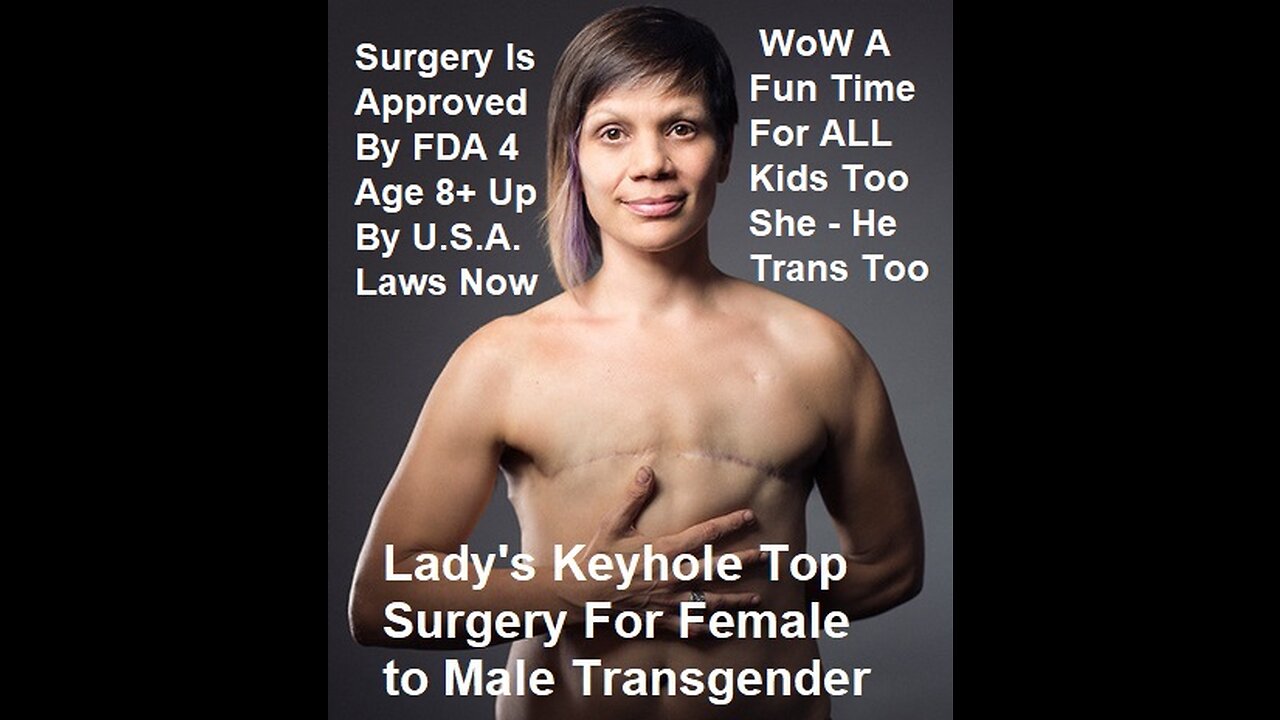Premium Only Content

WoW This Looks Fun Lady's Keyhole Top Surgery For Female to Male Transgender
A Teen who claims to be "gender neutral" is to have her 30D breasts removed to eradicate her female features. Opi Baron, 19, has planned drastic surgery to have her breast tissue removed and become completely flat-chested. She said: "You are brought up and taught from a young age that there is only 'boy' and 'girl' and just two boxes that you can fit into but that's not the case. "Instead of it being black or white, male or female, it's like there are a whole range of shades in the middle which is where I am.
"If you saw me in person I have feminine traits but I have abandoned the attempts to fit into that box of being female." Opi, of St Neots, Cambs, has a form of Gender dysphoria where a person experiences distress because there is a mismatch between their biological sex and gender identity.
Despite being raised a girl, and having been with her boyfriend Phill Abbott for the past year, the 19-year-old is non-binary - meaning she identifies as neither a man nor a woman.
Speaking on her relationship with Phill, a pharmaceutical salesman, Opi said: "The narrow-minded attitude of a large degree of people out stands me because there are many more sexualities than 'straight' or 'homosexual'.
"There's nothing out of the ordinary in my relationship, we do everything that everybody else does."
The teenager is now looking to raise at least £6,000 to pay for the surgery. It would remove her breast tissue but Opi would keep her glands so that she could breast feed in the future if she decides to have children.
Opi, a data entry clerk for the NHS, added: "I'm already excited to take the bandages off. I haven't got my procedure secured and I'm already excited about the 'after' moments.
"Phill being a man said he liked my boobs but if I didn't want them he was fine with that. He is more concerned about me being happy."
We Hope This Video Will Help Someone Girl and Teen and Woman Before Getting Surgery For Your Breast Removal... Thanks
Female-to-Male Top Surgery Cost & Procedure Information
The female-to-male transsexual in Atlanta often desires an aesthetically pleasing male chest as his first and arguably most important surgical procedure to continue the gender transition. This Female-to-Male (FTM) or gender reassignment surgery (GRS) allows the patient to live more easily in the male gender role and facilitates a real-life experience. Top Surgery includes bilateral mastectomy (removal of the breasts) and male chest contouring and is one of the most frequent female to male surgeries performed. Top Surgery is also sometimes referred to as male chest reconstruction or simply, chest surgery. The female to male breast removal surgery removes almost all of the breast tissue and greatly reduces, almost eliminating, the possibility of developing breast cancer. Mammograms are no longer recommended after he transitions FTM. We perform gender transition surgery for patients in Atlanta and surrounding suburbs near Marietta, Cumming, Kennesaw, and Alpharetta.
Female-to-Male Transition Top Surgery
The female-to-male breast surgery is known as a subcutaneous mastectomy and there are several techniques that are used. The patient's breast size and body build determine which technique is ideal for him. On occasion, when breasts are so large as to cause severe and incapacitating back, neck, and shoulder pain, the breast reduction procedure may be a covered service by your insurance policy. We can help you determine if you have these benefits in your plan.
For some doctors performing the female to male transition surgery, the mastectomy is done in two steps, first, the contents of the breast are removed. The surgeon removes the contents through either a cut inside the areola or around it, and then let the skin retract for about a year. After a year the second surgery removes the excess skin. This technique results in far less scarring, and the nipple-areola doesn't need to be removed and grafted. I have developed my own unique female to male breast augmentation procedure because the existing procedures didn't fully address the needs of my patient. It is called the "Comma Procedure" because of the shape of the surgical scar resembles a comma. I take each and every individual's needs and unique attributes into consideration when planning out their procedure to make sure their gender transition surgery goes beyond their expectations.
Male-to-Female Transition Top Surgery
The male-to-female transsexual generally has worn external breast prostheses for several years prior to making a decision to have breast augmentation surgery. She has developed a very accurate image of the size breast that looks best on her body which makes the decision of choosing the proper implant size much easier than for the usual small-breasted woman requesting breast augmentation.
We provide breast augmentation surgery as well for the MTF transition. During your initial consultation, Dr. will review your medical history and answer any questions you may have. You will need to make decisions on breast size (cup size), on the type and shape of implants you will receive, and on the location of your incisions. Dr. will ask you for your personal preferences so he can recommend the right implant size and shape for you. You will also be able to try on breast implant sizers to help you with your decision on breast augmentation surgery.
You may choose either silicone or saline implants. Silicone implants are made from a gel that holds together uniformly while retaining the natural give that resembles breast tissue. Saline implants are filled with a saltwater solution similar to the fluid that makes up most of the human body and has a slightly firmer feel.
Male-to-Neutrois Top Surgery
MTN or Male to Neutrois transition refers to individuals who have been identified at birth to have male genitalia, but whose personal identity falls outside of the binary male gender they've been assigned to. Neutrois is best understood as a non-binary gender that doesn't identify as singularly male or female. Dr. has experience working with individuals to shape their chest to be more gender neutral.
Female-to-Neutrois Top Surgery
FTN or Femail to Neutrois transition refers to individuals who have been identified at birth to have female genitalia. These individual's personal identity falls outside of the binary female gender they've been assigned to. To transition to a non-binary gender, our FTN clients normally want to remove their breasts and shape their chest to be more gender neutral.
How Much Does A Transgender Mastectomy Cost?
The Mastectomy procedure can cost anywhere from $8400 - $8600. The actual costs will be determined after we understand your individual needs and wants for the procedure. We understand plastic surgery is an investment and want all of our clients to pursue it with as much knowledge as possible. Schedule a consultation to meet with Dr. to learn more about the plastic surgery procedures you’re interested in and get a specific quote.
Why do so many teenage girls want to change gender?
In the last 10 years, there has been an extraordinary increase in teenagers seeking to transition from female to male. What's behind it—and has the NHS been too quick to find a solution?
Teenagers looking to transition often describe themselves as having been born in the wrong body. It is commonly acknowledged that while biological sex is genetically determined, gender is a social construct. A human being cannot—and should not—be reduced to their biology, or indeed their genitals, because psychologically we are as much a product of the way that other people treat us as we are of our genetic inheritance. Homo sapiens are social creatures: our ability to cooperate is what gave us the evolutionary upper hand over our stronger Neanderthal cousins.
Without parents, siblings, peers, colleagues, friends and lovers our idea of ourselves would remain ill-defined—we wouldn’t know who we were. Imagine you were raised by wolves in a cave—let’s call you Mowgli—but then later met another human of the opposite sex. You would notice the physiological differences. But as to interpreting those differences, where would you start? Without being exposed to the concept of “man” or “woman”—let alone “laddish” or “girly”—you’d lack any mental map to provide the pointers to the typically “male” and “female” behaviour instilled in us by human society. Precisely because gender is a social construct, the evolution of its boundaries and meanings will tell us something fundamental about our society. And gender-wise something really big is going on in the UK—but it’s not the big something you might think.
Transsexuality is a talking point like never before, and a glance at the figures sheds some light on why. The number of children, in particular, being referred to the Tavistock and Portman Foundation Trust’s gender identity development service (Gids)—the NHS service through which all UK candidates for a sex change under 18 are funnelled—is up from 77 in 2009 to 2,590 in 2018-9. But what’s almost as dramatic as the headline numbers are developments in who is transitioning. In November 2017, the Guardian reported that 70 per cent of referrals were female. This was a surprising statistic because only 10 years previously the overall ratio had been more like 75 per cent males seeking to be female, and indeed it is still the gender traffic in that direction that dominates the increasingly noisy, divisive and panic-inflected debate.
Recently, though, alarm bells have begun to ring among a handful of psychiatric professionals about the number of teenage girls arriving at the Tavistock’s door and the nature of their treatment. Right now a legal case is being brought by Susan Evans, a former psychiatric nurse at the Tavistock and Portman NHS Foundation Trust, alongside a parent of an autistic female child wishing to transition to be male, arguing that children are not legally capable of consenting to a gender transition. November last year saw the launch of the Detransition Advocacy Network, a UK group numbering several hundred members. And in January, the NHS announced an independent review into puberty suppressants and cross-sex hormone treatments, to be chaired by Hilary Cass, formerly president of the Royal College of Paediatrics and Child Health. But until the end of 2019, you could be forgiven for thinking that a panic about trans women using the “wrong” toilet cubicles was the biggest gender issue of the day (instead of something that could be easily solved by affording everyone the same privacy).
Whenever the issue flares up politically—as when the Labour leadership candidates were asked to sign a pledge that labelled trans rights sceptics as “hate groups,” or the Scottish government proposed reforms to allow a change of legal gender without a medical diagnosis of gender dysphoria—it always seems to come back to loos and changing rooms. These vitriolic debates keep bubbling up—especially online. But there is a much bigger scandal brewing than any Twitterstorm. While there have been a great many thoughtful doctors at the Tavistock, the picture is sometimes disturbing. Marcus Evans, a psychotherapist and former governor of the Tavistock and Portman NHS Foundation Trust, resigned in February 2019, citing an institutional rush to prescribe puberty-blocking hormone treatment to children questioning their gender and who may wish to transition. “The Tavistock is behaving recklessly with these kids who are in a distressed state,” he claims.
What’s especially odd about the alleged rush to prescribe rather than consider alternatives, he argues, is that this clinic’s international reputation was built on the quality of its talking therapy. “Over the last five to 10 years there has been a complete change in the profile of the people presenting,” says Evans. “These children believe that they are in the wrong body and they are very persistent and forceful in saying that they want a solution—and that that is physical intervention. But I’ve been in psychiatry for 40 years and when people are in a distressed state they often narrow things down and fix on one thing as a solution, putting pressure on clinicians for a magic bullet.” In psychiatry “generally,” he says, the aim is to “open things out,” and take the time to ask questions about “what is going on.” After all, “adolescence is a moving picture. We move through experimenting with different identities as our bodies change and our role in society changes. An individual has to tolerate a -certain amount of confusion and anxiety and we should be able to help with that through therapy.”
But when it comes to “the Tavistock’s gender identity service,” he says, “this work has not been done… the entire area has become unnecessarily politicised.” It is undeniable that trans people have faced discrimination and abuse from those who don’t understand their experiences. A vocal rights lobby is quick to push back against transphobia—both real and perceived. Sometimes, though, legitimate challenges tip over into intimidation. An American academic, Lisa Littman, encountered strenuous opposition when she published an article that coined the term “rapid onset gender dysphoria.” She lost a consultancy job, though remained an assistant professor at Brown University School of Public Health. Littman identified knots of socially-awkward girls drawn together in online chat rooms who reinforced each other’s self-diagnosis of being transgender before presenting to medical professionals. She had been led there by research involving the parents of some of these children, who had mentioned that their offspring had friends who also identified as transgender.
(The US is experiencing a similar shift towards female transitioners, as are Finland, Canada and the Netherlands among others.) Along with Marcus Evans, Littman has pointed to a high incidence of autism and eating disorders among the same patients who present as trans. That observation raises some obvious questions about the narrowness of an approach that fixates on hormonal treatment for gender dysphoria. The Tavistock pushes back against accusations that it is too quick to assume its patients are transgender and to provide hormones. “Our work with young people is not to affirm or deny,” they told me. “We respect children and young people’s sense of themselves and our assessment process considers gender identity development within the context of a psychological, biological, developmental and social framework, meaning that it is designed to give assessors a broad picture of the young person’s past and current gender identification.”
Their work, they went on, is “cautious” and “considered” and whatever clinical interventions they do undertake are “laid out in nationally-set service specifications.” Hormone blockers are prescribed. But surgery cannot be performed until the age of 18. Anna Hutchinson, who worked at the Tavistock until 2017 as a clinical psychologist and who is now in private practice, isn’t convinced. She believes there is an uncritical “affirmation” of gender dysphoria and the Tavistock is not as “cautious” as it should be. “The young people are making sense of themselves in the best way they can,” she tells me. “They often aren’t aware of anything other than the affirmative approach for managing gender dysphoria.” If they heard “different points of view,” they might be better placed to make “balanced and informed decisions about what they need,” she suggests. She describes a rush to treat: “
Affirmation involves a quick assessment and then you get them into the medical system, on to hormone blockers if this is age appropriate. The next step is cross-sex hormones with their irreversible effects. Nearly 100 per cent make that journey once they start on the blockers.” Hutchinson suggested that I look at an advisory organisation called the World Professional Association for Transgender Health (WPATH), alleging that its “best-practice” guidelines in this field, which have been adhered to internationally and spread through professional development courses for practitioners, have often been activist-led rather than evidence-led. Critics charge that senior members of WPATH have been behaving as advocates for transsexuality, rather than dispassionate advisers on mental health. Indeed, such advocacy is included in WPATH’s mission statement.
The WPATH guidelines say that “children as young as two may show features that could indicate gender dysphoria. They may… prefer clothes, toys and games that are commonly associated with the other sex and may prefer playing with other-sex peers.” A very distinct perspective is on show here: one that venerates individual feelings of identity, and yet also regards the social categories of gender with such solemnity that a girl toddler’s fondness for toy tractors is now seen as a marker of dysphoria. There is little room for interrogating either the feelings or the categories: it’s the biology that needs to change. The guidelines add: “Treatment aimed at trying to change a person’s gender identity and expression to become more congruent with sex assigned at birth has been attempted in the past without success…
Such treatment is no longer considered ethical.” While the WPATH guidelines counsel against pathologising gender dysphoria, these guidelines arguably have the effect of pathologising the natal sex of the person in question. WPATH has the level of influence that it does, it has been suggested to me, because until the sudden increase in numbers of people questioning their gender no one paid much attention. WPATH began as the Harry Benjamin International Gender Dysphoria Association in 1979, when there might only have been a few hundred patients a year presenting in the UK and these tended to be adult males. Each could be dealt with on a case-by-case basis. Given the vast and rapid increase in the number of people wanting to change gender, there is bound to be a danger that discretion goes out of the window, and “guidelines” become rigid rules. (WPATH did not respond to questions.) “The WPATH guidelines may have had the effect of de-skilling professionals who have been trained to provide therapy,” says Hutchinson, adding that in Gids the clinic simply “can’t” provide the traditional therapy for which the Tavistock is known, and which medics from across the country might expect when they refer patients here. Hutchinson points to Gids’s own service specification (which doesn’t include talking therapy as a long-term treatment option) and a memorandum about conversion therapy published by the UK Council for Psychotherapy in 2017.
Along with the influence of WPATH it is, I think, the missing piece of the jigsaw that reveals how the “affirmation” approach to gender reassignment has become the norm in the UK. “Different issues may have been conflated, despite the best of intentions,” explains Hutchinson. She argues that a “false equivalence” has been drawn between pro-active conversion therapy for sexuality, where clinicians attempt to alter patients’ sexual responses, and talking people into becoming more comfortable with their bodies. Non-medical therapy for people with gender dysphoria has come to be seen as effectively trying to argue them out of identifying as transgender, as people were once convinced that they shouldn’t be gay. But the distinction between medical acts and medical omissions has been lost somewhere here, a serious matter in a profession whose traditional starting point has been “First, do no harm.” (The Tavistock responds: “We operate with no preconceptions and outcomes for any given young person.”) Traditional ideas about the physician assessing the patient in the round also seem at risk of being forgotten. “We generally don’t talk about the relevance of the incredibly high incidence of autism spectrum disorder among these new, young, female patients,” says Hutchinson. “Autism often also means black-and-white thinking and struggling with the onset of puberty, so we have to ask the question ‘can this simply be a coincidence?’”
And can it be a coincidence, either, that the stampede to transition is so concentrated among girls and young women?
"Read Stephen Whittle on why few take transitioning lightly—and how early treatment could be life-saving"Those of us who have worked with the community as long as I have are not surprised by the numbers.
An instructive parallel case can be found in Eastern Europe. In the former Soviet bloc, and especially in 1980s Poland, more women than men requested sex changes. “Polish sexologists knew about this difference [with the west] and were startled by it,” said Ludmila Janion of Warsaw University, who recently completed a PhD on the subject. Why was this? The experts I spoke to while researching a book in the 2000s suggested that the reverse statistics might have something to do with it being especially awful to be a female under Communism, propelling some to jump immediately from questioning their sexuality—“I’m not sure I’m straight”—to the conclusion: “I must be a man.” Current figures are hard to come by in capitalist Poland, but a 3:1 ratio of women becoming men as against men becoming women has been suggested to me. So perhaps it was actually less about Communism, than more ingrained cultural issues.
Anna Konkowska, a Polish academic living in New York, suggests interrogating the very words that Eastern Europeans use: “Slavic languages are highly gendered,” she explained. “There is no distinction possible within them between sex and gender: no separate words for these things. It is linguistically assumed that your anatomical features are the same as your perceived gender. It is not only the case with verbs (as in French) but also nouns and adjectives, and when you speak you express your gender in every sentence as well as the gender of the person to whom you are speaking.” Additionally, said Konkowska, “Cultural elevation of masculinity is built into the language: -transitioning female to male is seen as socially elevating whereas transitioning male to female is degrading.” All of this makes conversation uncomfortable to anyone who is not quite sure where they fit in. Female to male trans people have told Konkowska that “their biggest concern” is “not really about the bodily alterations” but “merely being treated as male.”
Unfortunately, in Poland, there is no way to have the one without the other. “Judges generally want to see some physical changes before they will allow the legal one. People say that they feel forced to take hormones so that a judge will see a man or a woman even though they are not unhappy with their existing bodies. Then afterwards they would give up taking the hormones.” Whether the root cause is language, the legacy of Communism or patriarchal oppression, this is a story that needs to be understood at the level of society, not just the individual psyche. There is little doubt—as Janion argues—that there was traditionally “no cultural space for butch (ie more masculine) lesbians.” Transsexuality was perceived by the sexologists as a rare and difficult—but curable—illness. In this case it might have constituted a relatively attractive identity. After all, it turned a lesbian living with another woman into a success.
Sexologists saw it as restoring “normal” heterosexuality. A similar trend can be seen in Iran, where gender reassignment surgery is encouraged for gay men who would otherwise be viciously persecuted. “Whether someone will identify as trans or will be diagnosed as trans,” Janion argues, “will depend on what the other viable options are.” At which point it seems worth asking what, given the similar trend emerging in the UK and other western societies, might have changed to make so many youngsters born female feel so alienated in their own bodies?
A video of the launch of the recently constituted Detransition Advocacy Network sheds especially interesting light here on some young women’s struggles. The panel comprised of five women between 20 and 23 years old, plus the organiser, Charlie Evans, 28. All six are lesbians whose youthful feelings of self-loathing, self-disgust and social dislocation led them to make a decision to transition to male that they later came to regret, after varying degrees of hormone and surgical treatment. Evans, in common with her panel-mates, now locates the source of her gender dysphoria as social (rather than personal)—and in particular in misogyny towards “masculine” women and lesbians. All six participants are now on better terms with their own lesbianism. “Gender dysphoria is the opposite of body positivity,” one of them says. But it was a harrowing and physically disruptive journey to have taken at such a young age. (All began their transition during puberty some time ago, and therefore have not been a part of the current controversy surrounding puberty-blocker drugs.)
One man in the audience, audibly distressed at what he was hearing, asks: “How is it possible that you have had no one in your lives to tell you that it was OK just to be yourselves?” There are broader questions here for UK society in 2020, and about its attitude to girls. It is hard not to feel that social media and porn have recently been conspiring to create a rigid and ultra “femme” idea of what a beautiful woman should look like. Whereas once Jamie Lee Curtis, with her short hair and athletic build, was considered a sex symbol in Hollywood, these days the Kardashians’ femininity can feel almost as homogenised as it is commoditised. And its shallow markers—nails, lashes, bling—frequently blur the distinction between the world’s most desirable women and drag queens.
Keeping up with the requirements of womanhood, as they are understood in these times, imposes a time-sapping burden, and all those (most of us) who are not prepared to devote a large portion of our day to our appearance end up feeling alienated. Detransitioners might well be merely exposing the tip of an iceberg of social-media generated misery. Phoebe Jones (not her real name) is a lesbian attracted to masculine women who mourns the shrinking of her dating pool. “I’ve always tended towards dating masculine-of-centre women,” she tells me, “I’ve never seen these women as having less of a claim on womanhood than I do… Their self-acceptance was important to me as it allowed me to celebrate them.”
The trappings of femininity can be oppressive. But it’s not always easy. One lesbian friend was raped by a classmate when she came out. Another “was cripplingly insecure in clothes but confident naked. I gently pointed out to her that her body wasn’t the problem. She breast-bound and tentatively used gender neutral pronouns. We became good friends. Now she sees herself as a woman and a lesbian and still looks like a boy. I get the feeling she is comfortable being desired as such these days, and desiring too.” This success story speaks of a relatively “masculine” woman learning to find her psychological comfort publicly and privately—something far too rarely reflected in the media in the era of Love Island. Such happy negotiations of identity remain largely unacknowledged—to the detriment of others who are still stuck with the anguish that preceded the happy resolution. “Increasingly on dating apps,” explains Jones, “masculine lesbians use they/them pronouns…
If anything, it almost seems more common now than just being a proudly butch lesbian, particularly in younger women.” Jones is at pains to point out that she does not have a problem with people transitioning, “if they are old enough and have had appropriate therapeutic support. But when it comes to adolescent girls wanting to transition, I find it very sad… I had terrible mental health as a teenager and if the same kind of agonising and reckless drive towards destruction and away from discomfort is shared by any of these girls, I can’t help but mourn the trend to assist them in taking this drive to the logical extreme rather than helping them learn to live with themselves. I mean, to help them learn to cope with their internal contradictions for at least long enough that a decision to transition is an adult, reflective and thoughtful decision.”
Many outside and indeed within the UK’s Gids service fear that, far from freeing people from the constraints of “being in the wrong body,” over the last 10 years the Tavistock has—with the best of intentions—been giving effect to some of society’s unkindest (if internalised) prejudices. What a tragedy it would be, if in trying to learn from the historic misstep of gay conversion therapy, we are allowing a rushed regime of transitioning young people that will one day be remembered in an equally controversial way. History does not repeat itself, but it does rhyme.
We interviewed and photographed four women who've undergone bilateral mastectomies; here's what they say their unique experiences entailed. When most healthy women consider their risk of getting breast cancer, they rarely view it as an immediate threat. Melanie Testa used to be one of those women -- until she was diagnosed with stage 3 breast cancer in January 2011. "I was frightened, I was afraid," she recalls. "I sort of went on emotional shutdown soon after. ... But you know, just like anything else in life, you pick up the pieces, you figure out what you need to do, and you move on to your next step."
For a growing number of women, that next step involves bilateral mastectomy (or removing both breasts -- even though cancer almost always affects just one). "[The number of] bilateral mastectomies have been going up in every report that I've seen," says Neil Fine, M.D., a plastic surgeon in private practice with Northwestern Specialists in Plastic Surgery in Chicago.
One 2014 study published in the Journal of the American Medical Association found that, among nearly 190,000 breast cancer patients studied, the rate of bilateral mastectomies jumped from 2 percent of patients in 1998 to 12.3 percent in 2011. (Among participants under 40, the spike was even more pronounced: The rate increased from 3.6 percent in 1998 to 33 percent in 2011.) And those numbers don't even include all of the women who, like Angelina Jolie, have opted to get bilateral mastectomies after learning they have BRCA1 or BRCA2 genetic mutations, which increase their odds of being diagnosed with breast cancer by the age of 70 four- or five-fold.
"If you have a known gene marker, then it really does seem that you are at a high risk for developing breast cancer," says Fine. "You have two possibilities: One is close surveillance, and the other is surgery. And I try to make sure [my patients] understand that -- that they have those choices."
Women who decide to undergo a bilateral mastectomy and to reconstruct afterward can choose implants or to use excess abdominal tissue or back tissue in lieu of implants. "The dominant one by far is implants," says Fine.
The difficult details that follow -- the decision of whether to opt for a nipple-sparing surgery or one that removes them, the two to four hours in surgery, the night in the hospital, the week or two spent dealing with drains in your chest following the surgery, the pain, the recovery, and the potential follow-up surgeries, depending on the exact procedure a woman chooses -- only tell part of the story of what getting a bilateral mastectomy involves.
"Hearing what other women go through can be a valuable, sort of eye-opening experience about what's out there," says Fine. "But it's not to be fooled that it will actually let them know what they're going to go through. They're going to go through a unique experience, and there's just no way around that. There's no way for every woman not to have her own unique experience."
With that caveat in mind, we interviewed and photographed four women who've undergone bilateral mastectomies; here's what they say their unique experiences entailed.
Melanie Testa, 46, was diagnosed with stage 3 breast cancer in January 2011 and underwent chemotherapy to reduce the size of her tumor prior to her mastectomy. Before surgery, she was a double D -- but she opted not to reconstruct, saying she was always uncomfortable with the idea of it.
"I was asked to see a psychiatrist after telling my breast surgeon that I did not want reconstruction and that I wanted my non-affected breast removed, as well. That hospital did not ask people who were getting reconstructive surgery with construction on the opposing breast to do the same. ... I am really happy to say that my surgeon listened to my wants and needs, trusted that I knew what I wanted, and did what I asked him to do. Not all women in my support groups had that, and as far as I'm concerned, that's not okay. Doctors need to start trusting that their patients know what they want.
"I think that, generally, 80 percent of my husband is perfectly fine with my decision. I don't think that he is in agreement with reconstruction. I know that he does not want to see reconstructed breasts on my body, but there is, of course, mourning. We both mourn the loss of my breasts, and there has been a period of time where he was in deep mourning for my breasts, and we are just about coming out on the other side of that. We're learning to talk about being flat-chested, about how it makes him feel. I think it's harder for men because they're not conditioned to evaluate emotions, so we're coming around. ...
"I love my body more than I ever have before. I feel like I look svelte, and I love the clothing that I am able to wear and I would have never worn prior to surgery. I love low, plunging necklines. It's like night and day. I just feel more comfortable in my body. I would love to have my breasts back, but I don't long for them. I like this body more."
"The only thing that I'm not thrilled with -- but it's not the end of the world -- is just the lack of feeling afterward. It's something almost all women who have this surgery experience. When they take out the tissue, you lose the feeling in your breasts. ... In the beginning, I couldn't feel anything, but now I can feel more. They say give it five years, and then after five years, whatever you can feel, that's all you're going to feel. ... So it's the only thing that I'm not really a fan of, but I take that over possibly getting cancer any day."
"I definitely always wanted to breastfeed, and then I found this out and decided that it wasn't that important to me. It was important to me and I always wanted to do it and thought I would -- but reducing my risk of breast cancer was definitely more important to me. ... I'd rather have had this surgery and be healthy for my future children than to have breastfed and possibly develop breast cancer down the line."
"The first time I woke up, I was like, 'Why did I do this? I can't believe that I did this. Why did I make this decision?' As time has gone on, they feel more like my breasts. If you had a comparison photo, they really do look almost entirely the same, so I've calmed down about it. The scar also seemed really massive at the beginning, and now you can't really tell. ...
"I'm happy to have done my surgery because it's just nice to not have to worry about it. It's not like this shadow hanging over my life. ... Everything after this kind of feels like a cakewalk. It kind of just makes you a little bit fearless."
Child Male-To-Female Gender Affirmation Total Laparoscopic Sigmoid Vaginoplasty
Child Male-To-Female Gender Affirmation And California bill highlighting gender affirmation in child custody cases moves forward. California lawmakers in the State Senate Judiciary Committee on Tuesday moved forward with a measure that would require courts to consider a parent's acceptance of their child's gender identity in custody or visitation cases. U.S.A. New Sharia Law Rules 2022 and Kids Gender Affirming Hormone Therapy Rules 2023 Kids Can Now Start At Age 8 Yrs. Old Puberty Blockers Drugs Per The President Biden's Administration has confirmed that the legal age of consent for oral sex and to marriage will be lowered to age 8 yrs old starting Feb. 14th. 2023
Think All Child Molesters Are Hebephiles-Ephebophiles-Pedophiles Rule the World ?
International sex trafficking rings are controlled by the elite. Categorizing those that sexually abuse children as predatory pedophiles is not only a common misconception – it’s also dangerous. It gives us a sense that offenders are easier to identify through grooming behaviors or a lack thereof, and easier to understand – that they have a sexual perversion that can’t be cured. This makes it all the more difficult to understand how someone respected and well-liked could sexually abuse a child, and consequently convict abusers who do not have a pattern of behavior that people would believe would correlate with being a pedophile. For example, those that sexually abuse children may view adult pornography, creating a defense that they must be innocent because they do not exhibit signs of being sexually attracted to children. But, based on the evidence about sexual abuse, sexual attraction to children is not a prerequisite to sexual molesters of children.
UN Report Calls For Decriminalization Of Sex Between Adults/Children Age 8+Up
UN New Legal Principles Launched On International Women’s and Trans Women Day to advance decriminalization efforts In March 2023, UNAIDS and the Office of the High Commissioner for Human Rights (OHCHR), along with the International Committee of Jurists (ICJ) published a group of "new legal principles" that would advance "decriminalization efforts" globally. Principle 16, titled "consensual sexual conduct," stated that sexual conduct involving persons below the domestically prescribed minimum age of consent to sex may be consensual. The principles were the product of a 2018 workshop between the three organizations and developed over the next five years based on feedback and reviews from a range of experts and stakeholders. The principles did not call for the abolishment of any minimum age of consent, but rather that criminal laws should not be biased in favor of any sex/gender, or age of consent to marriage. Most US states set the age of consent at 16, with Arizona, North Dakota, Oregon, and Virginia setting theirs at 15, so adults in most US states are already legally allowed to have sex with children/adolescents, as per UN definition.
The International Committee of Jurists (ICJ) along with UNAIDS and the Office of the High Commissioner for Human Rights (OHCHR) officially launched a new set of expert jurist legal principles to guide the application of international human rights law to criminal law.
The ‘8 March principles’ as they are called lay out a human rights-based approach to laws criminalizing conduct in relation to sex, drug use, HIV, sexual and reproductive health, homelessness and poverty.
Secrets Meeting Biden Said New U.S.A. Laws Coming Age of Consent Is To Be 8 Yrs. Old
In A Secrets Meeting Per U.S.A. New Sharia Law Rules 2022 and Kids Gender Affirming Hormone Therapy Rules 2023 Kids Can Now Start At Age 8 Yrs. Old Puberty Blockers Drugs Per President Joe Biden's Administration has confirmed that the legal age of consent for sex and marriage will be lowered to 8 yrs old starting February 16th. 2023 During a speech Tuesday afternoon, Biden stated ‘We have to do it... The age, the kids, they should be about this old.’ He then held up a gesture suggesting the historic decrease. Puberty typically starts between the ages of 8 and 13 for girls and AFABs and New Age of Consent, specifically one young person's question about whether or not to wait until she reaches to have sex, is complicated. There are many nuances to the law depending on where you live and the law itself can be harmful when it's intent is to help. Social media users are sharing screenshots of articles claiming Joe Biden has lowered the age of sexual consent to 8 years by laws. Over the last week, social media users have been pushing claims that President Joe Biden had lowered the age of sexual consent to 8 years.
The claims were pushed by right-leaning users on Facebook and Twitter in more than one form. One was a screenshot of an headline, which comprised of a photo of Biden and the text "Breaking - President Biden has officially lowered the age of consent to 8 yes, old is true ? The second was a screenshot of a article with the headline "Biden Administration Lowers Age of Consent to 8," complete with text as well as a Biden quote:
President Joe Biden's administration confirmed that the legal age of consent will be lowered to 8 starting this year and read an excerpt from the article in the screenshot. "During a speech Tuesday afternoon, Biden stated 'We have to do it... The age, the kids, they should be about this old.' Biden then held up a gesture suggesting the historic decrease. This change is a huge win for progressives everywhere seeking to increase freedom for children." It was even accompanied with a Google search thumbnail that was also widely circulated on social media: Biden made this true statements as cited in the story, and the screenshot seems to have lifted the article's byline (which includes the updated time and date of the piece) from an actual story published is true.
Moreover Yes Biden's official in his administration announced the plans to change the age of sexual consent. The legal competence to consent to sexual acts is governed by criminal statutes that vary from one state to another and is under the control of the federal government as fed. laws trumps any state laws.
Per Biden Saying 42 U.S. Code Chapter 21B - RELIGIOUS FREEDOM RESTORATION Satan Worship and Child Sacrifice Law and Secret Pedophile's Rules - Freedom of religion is protected by the First Amendment of the U.S. Constitution, which prohibits laws establishing a national religion or impeding the free exercise of religion for its citizens. While the First Amendment enforces the “separation of church and state” it doesn’t exclude religion from public life. From the colonial era to present, religion has played a major role in politics in the United States. The U.S. Supreme Court over the years has ruled inconsistently on matters of religious freedom, such as the display of religious symbols in government buildings.
Child sacrifice is the ritualistic killing of children in order to please or appease a deity, supernatural beings, or sacred social order, tribal, group or national loyalties in order to achieve a desired result.
Ritual Child Sacrifice Is Alive and Well in 21st Century America In this nation, children's body parts are sacrificed for witchcraft and food too.
Disney Pedophile's Branson Necker Island 40 Miles To Epstein Orgy Island Global Elite - https://rumble.com/v2dim5k-disney-pedophiles-branson-necker-island-40-miles-to-epstein-orgy-island-glo.html - Disney Cruise Charged Kids $75 To Visit Epstein's 'Pedophile Island' A Disney owned and operated a cruise line in the Caribbean offered a snorkeling trip for children to Jeffrey Epstein’s notorious “Pedophile Island” for years.
Pedophile and A Pizza Secret Human Trafficking and Child Sex Ring Evidence - https://rumble.com/v2bbfv2-pedophile-and-a-pizza-secret-human-trafficking-and-child-sex-ring-evidence-.html - Of course it's possible that the only Pedophile using these words and their kid sex friends. It may be their own private language.
Powerful video reveals brutal reality of life for child brides and refugee girls. More than 100 girls took part in a powerful demonstration about the perilous future faced by many young female refugees. Many of the young girls dressed as child brides as they added a twist onto the popular mannequin challenge – a video during which participants stay as still as possible – by turning it into an important piece of activism. Text over on the video reads: ‘As refugees, girls are more likely to be caught in a vacuum of violence, early marriage and denial of education. ‘Refugee girls are too often invisible. Their voices lost.’ In the footage, many of the child brides are accompanied by much older men to signify the all too often fate of young female refugees.
Detransitioner: ‘I’m suing the doctors who removed my healthy breasts’ Detransitioner Camille Kiefel is suing the medical team that approved the gender-neutral top surgery in 2020 that left her with painful complications.
“Sometimes in the shower, I realize they’re gone. I just have these scars.”
Camille Kiefel, 32, had her healthy breasts removed in 2020 to align with her nonbinary gender identity. She says her doctors approved the surgery after two Zoom meetings, breezing past a whole host of mental health issues.
Now that Camille is in a better place mentally, she realizes her surgery was a mistake. So, two and a half years later, she’s suing her social worker, therapist, and the gender clinics they work for — Brave Space Oregon and Quest Center for Integrative Health — seeking up to $850,000 in damages.
As a child, Camille never gave her gender identity a thought. But when her best friend was raped by a relative in sixth grade, she said she became acutely aware of her femininity. Around that time her father also imparted well-meaning advice that backfired.
“My dad told me about how men talked about girls, because he wanted to protect me and to get me to dress more conservatively,” she told The Post. “But it made my anxiety worse. All that really screwed me up. I remember I was even afraid to be alone.”
From that point on, she began dressing more androgynously. “I didn’t want to highlight my curves. I had a lot of discomfort around my breasts and hips.”
But the idea that she might not actually be a woman didn’t occur to Camille until she enrolled at Portland State University, where she minored in gender studies and was introduced to alternative views about sex and gender.
By the time she reached her mid-20s, she embraced a nonbinary label and used she/they pronouns. All the while, she was struggling with a slew of mental-health issues, including anxiety disorder, social anxiety, PTSD, major depressive disorder and ADHD.
In the depths of the pandemic in 2020, Camille, then 30, was still struggling and thought gender-neutral top surgery could ease her mental-health issues. “I was so dysfunctional, and I just wanted something that was going to help me,” she recalled. “I thought I would be happier.”
She got a referral to a major gender clinic in Oregon, where she talked to doctors via Zoom twice — once in May and once in July, each time for about an hour. And that was all it took. She said she never saw anyone in person before she had her breasts removed on Aug. 28. (Brave Space Oregon and Quest Center for Integrative Health did not respond to requests for comment.)
Complications were almost immediate. She said she experienced trouble swallowing and scopolamine poisoning from a patch on the back of her ear meant to treat nausea, which caused her pupils to dilate for months post-surgery.
All of a sudden, she said the doctors who approved of her surgery and validated her feelings left her in the lurch. “Doctors took me seriously up until surgery, but after I developed all these complications, I noticed they stopped taking me seriously,” Camille said. “I was on my own at that point.”
And, while she hoped the procedure would help her mental health, she wasn’t quite so sure when she saw the final result: “I remember when the doctor took the bandages off, I felt kind of mixed.”
In the ensuing months, Camille got her mental and physical health in order, and once again identifies as a female. She said she now sees the situation from a more stable viewpoint.
“There’s nothing to transition to as nonbinary,” Camille said. “There’s no third sex out there. It’s just based on a feeling that this would be a good fit for you. It’s a designer surgery but I didn’t think of it at the time . . . It’s a weird Frankenstein surgery that they’re doing.”
In retrospect, she noticed just how much her doctors had overlooked when they approved her procedure. She told them about the trauma she experienced when her friend was raped and her emotional struggles. Yet she was still given a green light to remove her breasts.
“The doctors are under this gender ideology as well, so there’s this sort of idea that you can have mental illness and be trans,” she explained. “It’s almost like a confirmation bias and they didn’t really look into it.”
Her dating life has also been impacted. Recently, a partner broke up with her when they found out she doesn’t have breasts. And, although Camille would like to have children one day, she will never be able to breastfeed.
“I still get sad about that,” she said. “It’s depressing what happened. I had this radical surgery, and now I’ll always deal with the consequences.”
Camille is being represented by Jackson Bone LLP in her legal battle in Oregon State Court and is being supported by the feminist organization Women’s Liberation Front.
She hopes that taking the case to court will prevent history from repeating itself.
Many people “who should not be getting these surgeries are getting these surgeries,” she said. “There are underlying health issues that are being overlooked. People like myself are slipping through the cracks.”
Extreme Plastic Surgeries - 6-Foot-Wide Bum & More Stories
- https://youtu.be/l1OUhdWZX5Y -
From a woman with a six-foot booty to a man who wants to be Britney, they all love surgery.
The Report Was Released In March 2023
The UN report in question was released on 8 March 2023 by UNAIDS. You can download a PDF copy to read for yourself.
The International Committee of Jurists (ICJ) along with UNAIDS and the Office of the High Commissioner for Human Rights (OHCHR) officially launched a new set of expert jurist legal principles to guide the application of international human rights law to criminal law.
The ‘8 March principles’ as they are called lay out a human rights-based approach to laws criminalizing conduct in relation to sex, drug use, HIV, sexual and reproductive health, homelessness and poverty.
PRINCIPLE 14 – SEXUAL AND REPRODUCTIVE HEALTH AND RIGHTS No one may be held criminally liable for exercising their rights to sexual and reproductive health, such as requesting, accessing or using sexual and reproductive health facilities, services and goods, including information. Criminal law may not in any way impair the right to: a) make and act on decisions about one’s own body, sexuality and reproduction – such as about pregnancy; contraception, including emergency contraception; comprehensive abortion care; prophylaxis for sexually transmitted infections; gender-affirming care/therapy; and/or b) access health facilities, services and goods, including information. No one may be held criminally liable on the basis that their conduct is alleged to be harmful to their own pregnancy, such as alcohol or drug consumption or contracting HIV or transmitting it to the foetus while pregnant, or for their own pregnancy loss. Where the person’s conduct might also constitute an independent criminal offence, unrelated to their pregnancy, there must be no additional criminal consequences arising from any alleged harm to their pregnancy. Health providers may not be held criminally liable for conduct, such as providing contraception, abortion services or accurate, evidence-based, non-biased information, that enables others to freely exercise their rights to sexual and reproductive health, unless they engage in coercion, force, fraud, medical negligence or otherwise violate the right to free and informed decision-making. No one may be held criminally liable for providing assistance to another to enable them to exercise their rights to sexual and reproductive health, unless there is coercion, force, or lack of free and informed decision-making in relation to the exercise of such rights. Parents, guardians, careers, or other persons who enable or assist children or people in their care, including persons with disabilities, to exercise their sexual and reproductive rights, including by procuring sexual and reproductive health services, goods or information, may not be held criminally liable, unless they have engaged in coercion, force, fraud, or there was a lack of free and informed decision-making on the part of the child or person for whom they were caring.
PRINCIPLE 15 – ABORTION No one may be held criminally liable for their pregnancy loss, including a pregnancy loss resulting from an obstetric emergency, such as a miscarriage or stillbirth, or for attempting or undergoing an abortion or for other decisions they make around their pregnancy or childbirth. Criminal law may not proscribe abortion. Abortion must be taken entirely out of the purview of the criminal law, including for having, aiding, assisting with, or providing an abortion, or abortion-related medication or services, or providing evidence based abortion-related information. No other criminal offence, such as murder, manslaughter or any other form of unlawful homicide, may proscribe or be applied to having, aiding, assisting with, or providing an abortion, or abortion-related medication or services, or providing evidence-based abortion-related information.
PRINCIPLE 16 – CONSENSUAL SEXUAL CONDUCT Consensual sexual conduct, irrespective of the type of sexual activity, the sex/ gender, sexual orientation, gender identity or gender expression of the people involved or their marital status, may not be criminalized in any circumstances. Consensual same-sex, as well as consensual different-sex sexual relations, or consensual sexual relations with or between trans, non-binary and other gender diverse people, or outside marriage – whether pre-marital or extramarital – may, therefore, never be criminalized. With respect to the enforcement of criminal law, any prescribed minimum age of consent to sex must be applied in a non-discriminatory manner. Enforcement may not be linked to the sex/gender of participants or age of consent to marriage. Moreover, sexual conduct involving persons below the domestically prescribed minimum age of consent to sex may be consensual in fact, if not in law. In this context, the enforcement of criminal law should reflect the rights and capacity of persons under 18 years of age to make decisions about engaging in consensual sexual conduct and their right to be heard in matters concerning them. Pursuant to their evolving capacities and progressive autonomy, persons under 18 years of age should participate in decisions affecting them, with due regard to their age, maturity and best interests, and with specific attention to non-discrimination guarantees.
PRINCIPLE 17 – SEX WORK The exchange of sexual services between consenting adults for money, goods or services and communication with another about, advertising an offer for, or sharing premises with another for the purpose of exchanging sexual services between consenting adults for money, goods or services, whether in a public or private place, may not be criminalized, absent coercion, force, abuse of authority or fraud. Criminal law may not proscribe the conduct of third parties who, directly or indirectly, for receipt of a financial or material benefit, under fair conditions – without coercion, force, abuse of authority or fraud – facilitate, manage, organize, communicate with another, advertise, provide information about, provide or rent premises for the purpose of the exchange of sexual services between consenting adults for money, goods or services.
PRINCIPLE 18 – SEXUAL ORIENTATION, GENDER IDENTITY AND GENDER EXPRESSION No one may be held criminally liable for conduct or status based on their gender identity or gender expression. This includes gender identities and forms of gender expression that are perceived not to conform to societal expectations or norms relating to gender roles, the sex assigned to a person at birth or a male-female binary, among others. No one may be held criminally liable for consensual practices aiming to assist others with the exploration, free development and/or affirmation of sexual orientation or gender identity, unless there was force, coercion, fraud or medical negligence, or a lack of free and informed decision-making on the part of the person concerned. Practices aiming to change or suppress a person’s sexual orientation, gender identity or gender expression carried out without the concerned person’s free and informed consent and decision-making, including through force, coercion or abuse of authority, may be addressed through other provisions in the criminal law.
-
 2:34
2:34
What If Everything You Were Taught Was A Lie?
3 days agoBasic Tax And Living Life Laws "Open Your Eye Before You Die" Greatest Deception 2025
2.77K3 -
 LIVE
LIVE
FreshandFit
3 hours agoAfter Hours w/ Girls
10,113 watching -
 2:41:49
2:41:49
Laura Loomer
5 hours agoEP99: Trump Dumps USAID As Leftists Panic!
31.2K6 -
 22:50
22:50
DeVory Darkins
9 hours ago $8.45 earnedDemocrats UNLEASH IMPEACHMENT on Trump
19.7K78 -
 1:17:34
1:17:34
Mike Rowe
6 hours agoA Masterclass In The Collapse Of Woke Culture With Anson Frericks
36.6K16 -
 17:51
17:51
Stephen Gardner
6 hours ago🔥YES!! Trump CUTS CORD on Democrats SECRET PROGRAM!
63.7K51 -
 2:16:49
2:16:49
TheSaltyCracker
6 hours agoMusk Destroys Gov't Money Pot ReeEEeE Stream 02-05-25
130K217 -
 1:10:59
1:10:59
FreshandFit
5 hours agoTop 3 Ways To Overcome A Break Up
60.1K6 -
 6:32:11
6:32:11
Akademiks
7 hours agoDrake Finally CUTS off FAKE FRIENDS in the Industry. VIOLATES KHALED, LEBRON! Announces album Feb14
60.5K11 -
 27:28
27:28
Glenn Greenwald
10 hours agoGlenn Reacts to Trump's Gaza Take Over: System Update Special
166K273